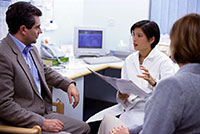How Is Sleep Apnea Diagnosed?

Doctors diagnose sleep apnea based on medical and family histories, a physical exam, and sleep study results. Your family doctor may evaluate your symptoms first, then decide whether you need to see a sleep specialist. Sleep specialists are doctors who diagnose and treat people who have sleep problems.
Medical and Family Histories
Your doctor will ask you questions about how you sleep and how you function during the day. He or she also will want to know how loudly and often you snore or make gasping or choking sounds during sleep. Often you’re not aware of such symptoms and must ask a family member or bed partner to report them.
Let your doctor know if anyone in your family has been diagnosed with sleep apnea or has had symptoms of the disorder.
Physical Exam
Your doctor will check your mouth, nose and throat for extra or large tissues. Adults who ahe sleep apnea may have an enlarged uvula or soft palate. The uvula is the tissue that hangs from the middle of the back of your mouth. The soft palate is the roof of your moth in the bvack of your throat.
Sleep Studies (Polysomnogram, PSG)
Sleep studies are tests that measure how well you sleep and how your body responds to sleep problems. These tests can help your doctor find out whether you have a sleep disorder and how severe it is. Sleep studies are the most accurate tests for diagnosing sleep apnea.
A PSG often are done at sleep centers or sleep labs. The test is painless. You’ll go to sleep as usual, except you’ll have sensors attached to your scale, face, chest, limbs, and a finger. The staff at the sleep center will use the sensors to check on you throughout the night.
A sleep specialist will review the results of your PSG to see whether you have sleep apnea and how severe it is. He or she also may use a PSG to find the best setting for you on a CPAP machine. CPAP is the most common treatment for sleep apnea. A CPAP machine uses mild air pressure to keep your airway open while you sleep.
If the PSG shows that you have sleep apnea, you’ll use a CPAP machine during the second study. The staff at the sleep lab will adjust the flow of air from the CPAP machine to find the setting that works best for you.
|